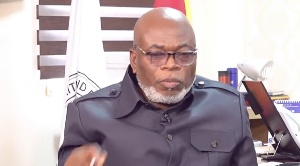- Home - News
- Elections 2024
- News Archive
- Crime & Punishment
- Politics
- Regional
- Editorial
- Health
- Ghanaians Abroad
- Tabloid
- Africa
- Religion
- Photo Archives
- Press Release
Editorial News of Monday, 31 March 2025
Source: www.ghanawebbers.com
'PAC exposes corruption, but the executive lets them go free' - Avedzi
For years, the Public Accounts Committee (PAC) has exposed major corruption cases. They question public officials on live television and recommend prosecutions. However, no action follows these recommendations.
The same officials return to their jobs, and funds continue to disappear. This cycle repeats itself without change.
James Klutse Avedzi, former PAC chairman and current Director General of the Securities and Exchange Commission, sees a clear problem. He believes the Executive branch is blocking anti-corruption efforts.
Avedzi led PAC from 2017 and noted a systematic failure that allows corruption to thrive. He stated, “Ghanaians think that the committee can punish people on the spot, but we cannot.” The committee can only make recommendations.
And they have made many recommendations. Avedzi said he cannot even count how many people they recommended for prosecution to the Attorney General. Yet after that, progress halts.
According to Avedzi, the issue lies not with Parliament but with the Executive branch. PAC’s work relies on Auditor General reports that highlight financial mismanagement and suspected corruption.
The committee investigates these issues, interrogates officials, and submits reports to Parliament. Avedzi mentioned that “100% of my reports have always been adopted.”
However, it is up to the Executive to implement Parliament's decisions. That is where everything falls apart.
One notable example is the Sky Train scandal. Millions were spent on a project that never happened. Despite PAC recommending prosecutions, nothing was done for years.
Recently, the Attorney General claimed action is finally being taken regarding these recommendations. Avedzi remains cautious; he has seen too many recommendations ignored while officials go unpunished.
At one point, the Attorney General’s office claimed they had not received PAC’s list of officials for prosecution. The Attorney General told PAC there was no communication from Parliament about this matter.
Avedzi took steps to ensure proper communication between Parliament and the Attorney General's office. It took two years for this communication to happen—and still nothing changed afterward.
He believes corruption will persist until officials face real consequences for their actions. “If those who violate procurement laws are prosecuted,” he said, “it will deter others.”
Currently, officials know facing PAC leads to no repercussions. This lack of enforcement allows corruption to continue unchecked.
“The solution is simple: let’s punish those involved,” Avedzi stated firmly. Recommendations in reports must be implemented for real change.
Without enforcement, he warns that PAC will remain just another bureaucratic formality—exposing wrongdoing without making an impact.
“People appear before PAC and answer questions on television,” he explained. “But once it goes to the Executive, they don’t implement anything.”
Avedzi emphasized that unless the Executive takes action, Ghana's anti-corruption efforts will remain ineffective public displays without consequences.
“Officials know they can return to their offices as if nothing happened,” he concluded. “If we are serious about fighting corruption, this must change.”











